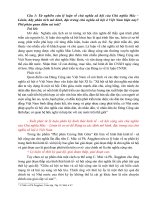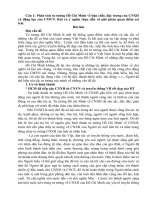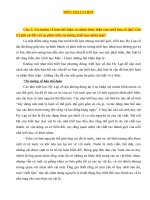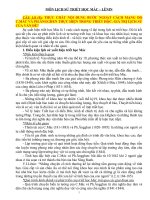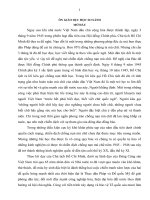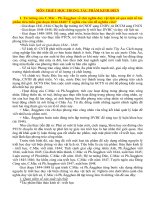ĐỀ THI TUYỂN SINH ĐẠI HỌC NĂM 2012 Môn: TIẾNG ANH; Khối A1 MÃ 859
Bạn đang xem bản rút gọn của tài liệu. Xem và tải ngay bản đầy đủ của tài liệu tại đây (214.07 KB, 7 trang )
BỘ GIÁO DỤC VÀ ĐÀO TẠO
ĐỀ CHÍNH THỨC
(Đề thi có 07 trang)
ĐỀ THI TUYỂN SINH ĐẠI HỌC NĂM 2012
Môn: TIẾNG ANH; Khối A1
Thời gian làm bài: 90 phút, không kể thời gian phát đề
Mã đề thi 859
Họ, tên thí sinh:.......................................................................
...
Số báo danh:............................................................................
ĐỀ THI GỒM CÓ 80 CÂU (TỪ QUESTION 1 ĐẾN QUESTION 80)
Mark the letter A, B, C, or D on your answer sheet to indicate the sentence that is CLOSEST in
meaning to each of the following questions.
Question 1: Fiona has been typing the report for an hour.
A. Fiona will finish typing the report in an hour.
B. Fiona finished the report an hour ago.
C. It is an hour since Fiona started typing the report.
D. It took Fiona an hour to type the report.
Question 2: Walking on the grass in the park is not permitted.
A. We must not walk on the grass in the park.
B. You can walk on the grass in the park if you want to.
C. People like walking on the grass in the park.
D. We do not have to walk on the grass in the park.
Question 3: Soil erosion is a result of forests being cut down carelessly.
A. Soil erosion results in forests being cut down carelessly.
B. That forests are being cut down carelessly leads to soil erosion.
C. Soil erosion contributes to forests being cut down carelessly.
D. That forests are being cut down carelessly results from soil erosion.
Question 4: “I will not leave until I see the manager,” said the customer.
A. The customer said he would leave before he saw the manager.
B. The customer decided to leave because he did not see the manager.
C. The customer refused to leave until he saw the manager.
D. The customer was persuaded to see the manager before leaving.
Question 5: She prefers going to the library to staying at home.
A. She would rather go to the library than stay at home.
B. She does not like either going to the library or staying at home.
C. She likes nothing better than going to the library.
D. She stays at home instead of going to the library.
Question 6: No matter how hard Fred tried to lose weight, he did not succeed.
A. Fred tried very hard to lose weight and succeeded.
B. It was hard for Fred to lose weight because he never succeeded.
C. However hard Fred tried, he could not lose weight.
D. It did not matter whether Fred could lose weight.
Question 7: “Please accept my apology for arriving late,” said Janet to her employer.
A. Janet quickly made an apology and the employer accepted it.
B. Janet apologised to her employer for her late arrival.
C. Janet thought she would apologise to her employer for arriving late.
D. Janet had to make an apology because her employer demanded it.
Question 8: She did not study hard enough to win the scholarship.
A. Winning the scholarship did not make her study harder.
B.
It was very hard for her to win the scholarship.
C. She studied hard but she could not win the scholarship.
D. She could have won the scholarship if she had studied harder.
Trang 1/7 - Mã đề thi 859
Question 9: To my surprise, the stranger knew my name.
A. I was surprised that the stranger knew my name.
B. It surprised the stranger that I knew his name.
C. My name was the only thing the stranger knew.
D. What surprised me most was the stranger’s name.
Question 10: The situation was so embarrassing that she did not know what to do.
A. It was such an embarrassing situation; however, she did not know what to do.
B. She did not know what to do, though it was not an embarrassing situation.
C. So embarrassing was the situation that she did not know what to do.
D. So embarrassing the situation was that she did not know what to do.
Read the following passage on transport, and mark the letter A, B, C, or D on your answer sheet to
indicate the correct answer to each of the questions from 11 to 20.
Most journeys in Britain and the US are made by road. Some of these are made on public transport
but most are by private car.
In Britain many people rely on their cars for daily local activities, e.g. getting to work, doing the
shopping, and visiting friends. People living in urban areas may use buses, trains or, in London, the
Underground, to get to city centres, mainly because traffic is often heavy and it is difficult to find
anywhere to park a car. Some places in the country may have a bus only two or three times a week so
people living there have no choice but to rely on their cars.
In the US large cities have good public transportation systems. The El railroad in Chicago and the
underground systems of New York, Boston, San Francisco and Washington, DC are heavily used.
Elsewhere, most Americans prefer to use their cars. Families often have two cars and, outside major
cities, have to drive fairly long distances to schools, offices, shops, banks, etc. Many college and even
high-school students have their own cars.
Long-distance travel in Britain is also mainly by road, though railways link most towns and cities.
Most places are linked by motorways or other fast roads and many people prefer to drive at their
own convenience rather than use a train, even though they may get stuck in a traffic jam. Long-
distance coach/bus services are usually a cheaper alternative to trains, but they take longer and may
be less comfortable. Some long-distance travel, especially that undertaken for business reasons, may
be by air. There are regular flights between regional airports, as well as to and from London. A lot of
freight is also distributed by road, though heavier items and raw materials often go by rail.
In the US much long-distance travel is by air. America has two main long-distance bus companies,
Greyhound and Trailways. Amtrak, the national network, provides rail services for passengers.
Private railway companies such as Union Pacific now carry only freight, though in fact over 70% of
freight goes by road.
The main problems associated with road transport in both Britain and the US are traffic congestion
and pollution. It is predicted that the number of cars on British roads will increase by a third within a
few years, making both these problems worse. The British government would like more people to use
public transport, but so far they have had little success in persuading people to give up their cars or to
share rides with neighbours. Most people say that public transport is simply not good enough.
Americans too have resisted government requests to share cars because it is less convenient and
restricts their freedom. Petrol/gasoline is relatively cheap in the US and outside the major cities
public transport is bad, so they
see no reason to use their cars less.
(Extracted from Oxford Guide to British and American Culture, Oxford University Press, 2000)
Question 11: In Britain and the US most people travel by ______.
A. road B. rail C. air D. sea
Question 12: According to the passage, people in London may prefer the Underground to their own
cars due to ______.
A. long distances B. heavy traffic C. air pollution D. cheap tickets
Trang 2/7 - Mã đề thi 859
Question 13: It is mentioned in paragraph 3 that the public transportation systems in the US are good
in ______.
A. some states B. large cities C. all cities D. large states
Question 14: Which of the following is NOT true according to the passage?
A. Few college students in the US have their own cars.
B. Families in the US often have more than one car.
C. Most Americans prefer to drive their cars outside large cities.
D. The underground systems are popular in some major US cities.
Question 15: The phrase “at their own convenience” in paragraph 4 is closest in meaning to ______.
A. at the latest time and nearest place B. at the fastest time and nearest place
C. at an appropriate time and place D. at an early time and nearby place
Question 16: Which of the following is true about transport in Britain?
A. Trains are usually cheaper than long-distance coach services.
B. There are no regular flights between regional airports.
C. Heavier items and raw materials are often transported by train.
D. Long-distance travel in Britain is only by road.
Question 17: According to the information in paragraph 5, long-distance travellers in the US can
choose from ______ mode(s) of transport.
A. four B. three C. two D. one
Question 18: It is stated in the passage that the major problems of road transport in Britain and
the US are ______.
A. accidents and pollution B. speeding and bad roads
C. drink-driving and traffic jams D. traffic jams and pollution
Question 19: According to the passage, people in Britain refuse public transport because ______.
A. they see no reason to use their cars less B. petrol is relatively cheap in Britain
C. they like to share rides with neighbours D. they think it is not good enough
Question 20: The word “they” in the last sentence of the passage can best be replaced by ______.
A. neighbours B. major cities C. the
government D. Americans
Mark the letter A, B, C, or D on your answer sheet to indicate the word or phrase that is OPPOSITE
in meaning to the underlined part in each of the following questions.
Question 21: The consequences of the typhoon were disastrous due to the lack of precautionary
measures.
A. severe B. physical C. damaging D. beneficial
Question 22: Vietnam’s admission to the World Trade Organisation (WTO) has
promoted its trade
relations with other countries.
A. restricted B. boosted C. balanced D. expanded
Mark the letter A, B, C, or D on your answer sheet to indicate the word or phrase that is CLOSEST
in meaning to the underlined part in each of the following questions.
Question 23: Although they hold similar political views, their religious beliefs present a
striking contrast.
A. minor comparison B. significant difference
C. complete coincidence D. interesting resemblance
Question 24: Within a week on display at the exhibition, the painting was hailed as
a masterpiece.
A. a down-to-earth work of art B. a large work of art
C. an excellent work of art D. an expensive work of art
Question 25: These were the people who
advocated using force to stop school violence.
A. publicly said B. strongly condemned
C. openly criticised D. publicly supported
Trang 3/7 - Mã đề thi 859
Mark the letter A, B, C, or D on your answer sheet to indicate the word that differs from the rest in
the position of the main stress in each of the following questions.
Question 26: A. tradition B. memory C. socialise D. animal
Question 27: A. interactive B. ability C. inaccurate D. biology
Question 28: A. similar B. calculate C. chemical D. attractive
Question 29: A. actor B. rubbish C. career D. cocktail
Question 30: A. release B. believe C. amaze D. offer
Read the following passage on social issues in American schools, and mark the letter A, B, C, or D
on your answer sheet to indicate the correct word for each of the blanks from 31 to 40.
In addition to the challenge to be excellent, American schools have been facing novel problems. They
must (31)______ with an influx of immigrant children, many of whom speak little or no English.
They must respond to demands (32)______ the curriculum reflect the various cultures of all children.
Schools must make sure that students develop (33)______ skills for the job market, and they must
consider the needs of nontraditional students, such as teenage mothers.
Schools are (34)______ these problems in ways that reflect the diversity of the US educational
system. They are hiring or training large numbers of teachers of English (35)______ a second
language and, in some communities, setting up bilingual schools. They are opening (36)______ the
traditional European-centered curriculum to embrace material from African, Asian, and other
cultures.
Schools are also teaching cognitive skills to the (37)______ 40 percent of American students who
do not go on to higher education. In the (38)______ of a recent report by the Commission on
Achieving Necessary Skills, “A strong back, the willingness to work, and a high school diploma were
once all that was necessary to (39)______ a start in America. They are no longer. A well-developed
mind, a continued willingness to learn and the ability to put knowledge to work are the new keys
(40)______ the future of our young people, the success of our business, and the economic well-being
of the nation.”
(Extracted from InfoUSA – CD Version)
Question 31: A. stay B. cope C. fight D. do
Question 32: A. that B. what C. whether D. who
Question 33: A. basis B. base C. basic D. basics
Question 34: A. discharging B. distributing C. delivering D. addressing
Question 35: A. as B. with C. like D. from
Question 36: A. into B. for C. up D. on
Question 37: A. slightly B. mostly C. fairly D. nearly
Question 38: A. ways B. minds C. directions D. words
Question 39: A. take B. get C. make D. bring
Question 40: A. at B. for C. in D. to
Mark the letter A, B, C, or D on your answer sheet to indicate the correct answer to each of the
following questions.
Question 41: I can’t find my dictionary at the moment. I hope it will ______ up soon.
A. turn B. come
C. clear D. look
Question 42: Tom: “Can I have another cup of tea?”
Christy: “______.”
A. Allow yourself B. Help yourself C. Be yourself D. Do it yourself
Question 43: I ______ with my aunt when I am on holiday in Ho Chi Minh City next month.
A. will have been staying B. will be staying
C. will have stayed D. stay
Trang 4/7 - Mã đề thi 859
Question 44: He died ______ lung cancer last month, leaving his wife in great shock.
A. for B. of C. in D. by
Question 45: Geometry is a branch of mathematics ______ the properties of lines, curves, shapes, and
surfaces.
A. that it is concerned with B. that concerned with
C. that concerning with D. concerned with
Question 46: Although we have a large number of students, each one receives ______ attention.
A. only B. alone C. separate D. individual
Question 47: The language centre offers courses of various levels, such as elementary, intermediate
and ______.
A. advanced B. advancing C. advance D. advancement
Question 48: She passed the National High School Graduation Exam with ______ colours.
A. true B. red C. bright D. flying
Question 49: They live on a busy road. ______ a lot of noise from traffic.
A. There must have B. There must be C. It must have been D. It must be
Question 50: Due to ever more spreading poaching, there ______ a dramatic decline in the number
of elephants over the last decade.
A. has been B. had been C. was D. is
Question 51: I ______ work last week, but I changed my mind.
A. have started B. was going to start C. had started D. would start
Question 52: The Principal usually has his pupils ______ waste paper for their mini-project.
A. collect B. having collected C. collected D. to collect
Question 53: ______ make a good impression on her.
A. Only so doing can I B. Only by so doing I can
C. Only by doing so I can D. Only by doing so can I
Question 54: People don’t like the way he shows off, ______?
A. do they B. does he C. don’t they D. doesn’t he
Question 55: He is a very intelligent boy; ______, he sometimes gets bad marks.
A. however B. otherwise C. thus D. so
Question 56: Anna is holding her shopping bag with one hand and turning the door handle with ______.
A. another B. the other C. other D. others
Question 57: ______ that Columbus discovered America.
A. It was in 1492 B. There was in 1492 C. In 1492 D. That was in 1492
Question 58: Nowadays, with the help of the computer, teachers have developed a ______ approach
to teaching.
A. multilingual B. multimedia C. multilateral D. multiple-choice
Question 59: She started the course two months ago but dropped ______ after only a month.
A. off B. in C. back D. out
Question 60: Lora: “Do you mind if I turn on the fan?”
Maria: “______.”
A. Not for me B. Never mind C. Not enough D. Not at all
Question 61: The use of vitamin ______ and herbs has become increasingly popular among Americans.
A. materials B. supplements C. components D. ingredients
Question 62: No matter how angry he was, he would never ______ to violence.
A. refuse B. resist C. resort D. resolve
Question 63: He came ______ a lot of criticism for the remarks he made in a television interview.
A. in for B. out of C. off D. over
Question 64: The children made ______ a funny story and wrote it on the card.
A. for B. up C. off D. out
Trang 5/7 - Mã đề thi 859



